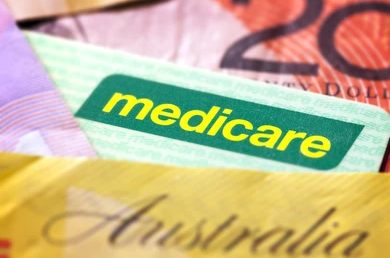Is Medicare losing billions of dollars annually? Shocking report reveals the truth - Are your tax dollars at risk?
By
- Replies 2
Accessible healthcare is a fundamental right that should be available to everyone.
In Australia, Medicare plays a crucial role in ensuring that all citizens have access to free or subsidised healthcare.
With Medicare, Australians can receive essential medical services and treatments without harsh financial barriers, promoting a healthier life.
However, a new report by the federal government is raising alarms about the problems with Medicare’s complex systems. It warns that large amounts of taxpayer money could be at risk if no action is taken.
According to the review conducted by health economist Pradeep Philip, patients are currently losing between $1.5 billion to $3 billion due to Medicare fraud and non-compliance.

Essentially, this money goes towards health services that aren’t properly documented or accounted for.
Dr Philip explained: ‘On a conservative definition of non-compliance and fraud, it is entirely feasible the value of non-compliance could exist in the range of $1.5 billion to $3 billion.’
‘Legislation, governance, systems, processes, and tools are currently not fit for purpose and, without significant attention, will result in significant levels of fraud.’
However, the Australian Medical Association (AMA) and the Royal Australian College of General Practitioners (RACGP) disputed those assertions.
It should be noted that last year, ABC's 7.30 program and Nine newspapers conducted a joint investigation that exposed flaws in Medicare's systems, making it effortless for some medical practitioners to commit fraud without detection.
According to Margaret Faux, founder of the Synapse Medical Services, about 30 per cent of the annual Medicare budget, or approximately $8 billion, was lost due to fraud and waste.
However, the Philip review revealed that most of the lost money was due to non-compliance errors rather than deliberate fraud, which is a relief as it means that the majority of health professionals are acting appropriately.
Dr Philip's report raised the possibility that Medicare fraud and noncompliance could reach the $8 billion estimate made by Dr Faux if new controls, systems, and education are not implemented.
In an interview with ABC, Dr Faux defended her estimate and stated that she had witnessed a significant increase in fraud in corporate medical practices over the last few years.
She argued: ‘I do this for a living; I'm at the coalface.’
‘I see what's going on in the system, and I have seen a huge surge over the last couple of years in straight-up fraud in corporate medical practices.’
However, she emphasised that the exact amount of fraud was not the primary issue but rather the need to stop it altogether.
She continued: ‘The numbers are huge, and whether it's deliberate or unintentional doesn't matter. It needs to stop.’
As part of the Philip review, 23 recommendations were made, including improved governance, updated Medicare legislation to meet current health requirements, and the development of better systems to identify and prevent fraud and non-compliance.
Dr Faux concurred that regulatory reform was necessary to prevent wastage in Medicare and called for enhanced education for patients and providers.
She also suggested that a royal commission should examine the entire system, not just the GP network.
According to AMA President Steve Robson, the Philip report cleared most medical professionals following the rules.
Professor Robson said: ‘The AMA has said it doesn’t tolerate fraud all along. We are ready to work with the government, as we have consistently done in the past, to improve the governance of Medicare payment systems and associated compliance arrangements.’
He further acknowledged that the entire system had become too intricate, resulting in billing errors by doctors attempting to provide the best care for their patients while working with an outdated system.
This issue is compounded by the lack of education and definitive guidelines on billing for certain Medicare-funded services.
Health Minister Mark Butler did note, however, that the government was taking steps to protect the system and the money being lost.
'Australians know that the overwhelming majority of our doctors and health professionals are honest, hardworking and comply with Medicare rules,' he remarked.
'But they also understand that, at a time of great pressure on household and government budgets, every dollar in Medicare is precious and must be spent directly on patient care.'
The government has acknowledged that the loss of billions of dollars annually from Medicare due to fraud and waste was repeatedly flagged to former Coalition governments in five reviews conducted between 2016 and 2021.
Butler added: ‘They failed to act to protect Medicare.’
Coalition health spokeswoman Anne Ruston disagreed with these claims.
She pointed out: ‘In government, the Coalition increased funding and implemented significant reforms to improve Medicare compliance arrangements, including through measures that sought to recover $2 billion worth of non-compliant Medicare claims a year.’

Holding the government accountable for implementing these changes is crucial, ensuring that taxpayer funds are used efficiently and effectively to provide healthcare services to those who need them.
By staying informed and advocating for the responsible use of taxpayer money, we can contribute to a fair and equitable healthcare system for all Australians.
What are your thoughts on this? Do you think that more needs to be done to crack down on Medicare fraud? Let us know in the comments below!
In Australia, Medicare plays a crucial role in ensuring that all citizens have access to free or subsidised healthcare.
With Medicare, Australians can receive essential medical services and treatments without harsh financial barriers, promoting a healthier life.
However, a new report by the federal government is raising alarms about the problems with Medicare’s complex systems. It warns that large amounts of taxpayer money could be at risk if no action is taken.
According to the review conducted by health economist Pradeep Philip, patients are currently losing between $1.5 billion to $3 billion due to Medicare fraud and non-compliance.

An independent review found that Medicare fraud and non-compliance cost Australia between $1.5 billion and $3 billion annually. Credit: Shutterstock.
Essentially, this money goes towards health services that aren’t properly documented or accounted for.
Dr Philip explained: ‘On a conservative definition of non-compliance and fraud, it is entirely feasible the value of non-compliance could exist in the range of $1.5 billion to $3 billion.’
‘Legislation, governance, systems, processes, and tools are currently not fit for purpose and, without significant attention, will result in significant levels of fraud.’
However, the Australian Medical Association (AMA) and the Royal Australian College of General Practitioners (RACGP) disputed those assertions.
It should be noted that last year, ABC's 7.30 program and Nine newspapers conducted a joint investigation that exposed flaws in Medicare's systems, making it effortless for some medical practitioners to commit fraud without detection.
According to Margaret Faux, founder of the Synapse Medical Services, about 30 per cent of the annual Medicare budget, or approximately $8 billion, was lost due to fraud and waste.
However, the Philip review revealed that most of the lost money was due to non-compliance errors rather than deliberate fraud, which is a relief as it means that the majority of health professionals are acting appropriately.
Dr Philip's report raised the possibility that Medicare fraud and noncompliance could reach the $8 billion estimate made by Dr Faux if new controls, systems, and education are not implemented.
In an interview with ABC, Dr Faux defended her estimate and stated that she had witnessed a significant increase in fraud in corporate medical practices over the last few years.
She argued: ‘I do this for a living; I'm at the coalface.’
‘I see what's going on in the system, and I have seen a huge surge over the last couple of years in straight-up fraud in corporate medical practices.’
However, she emphasised that the exact amount of fraud was not the primary issue but rather the need to stop it altogether.
She continued: ‘The numbers are huge, and whether it's deliberate or unintentional doesn't matter. It needs to stop.’
As part of the Philip review, 23 recommendations were made, including improved governance, updated Medicare legislation to meet current health requirements, and the development of better systems to identify and prevent fraud and non-compliance.
Dr Faux concurred that regulatory reform was necessary to prevent wastage in Medicare and called for enhanced education for patients and providers.
She also suggested that a royal commission should examine the entire system, not just the GP network.
According to AMA President Steve Robson, the Philip report cleared most medical professionals following the rules.
Professor Robson said: ‘The AMA has said it doesn’t tolerate fraud all along. We are ready to work with the government, as we have consistently done in the past, to improve the governance of Medicare payment systems and associated compliance arrangements.’
He further acknowledged that the entire system had become too intricate, resulting in billing errors by doctors attempting to provide the best care for their patients while working with an outdated system.
This issue is compounded by the lack of education and definitive guidelines on billing for certain Medicare-funded services.
Health Minister Mark Butler did note, however, that the government was taking steps to protect the system and the money being lost.
'Australians know that the overwhelming majority of our doctors and health professionals are honest, hardworking and comply with Medicare rules,' he remarked.
'But they also understand that, at a time of great pressure on household and government budgets, every dollar in Medicare is precious and must be spent directly on patient care.'
The government has acknowledged that the loss of billions of dollars annually from Medicare due to fraud and waste was repeatedly flagged to former Coalition governments in five reviews conducted between 2016 and 2021.
Butler added: ‘They failed to act to protect Medicare.’
Coalition health spokeswoman Anne Ruston disagreed with these claims.
She pointed out: ‘In government, the Coalition increased funding and implemented significant reforms to improve Medicare compliance arrangements, including through measures that sought to recover $2 billion worth of non-compliant Medicare claims a year.’
Key Takeaways
- An independent review found that between $1.5 billion to $3 billion is lost to Medicare fraud and non-compliance annually in Australia.
- The review, led by health economist Pradeep Philip, concluded that the overly-complex and out-of-date system is at risk of losing even more taxpayer money.
- A significant portion of the lost money was due to non-compliance errors rather than deliberate fraud.
- The review made 23 recommendations, including improved governance, updated legislation related to Medicare, and better systems for detecting and disrupting fraud and non-compliance.
Holding the government accountable for implementing these changes is crucial, ensuring that taxpayer funds are used efficiently and effectively to provide healthcare services to those who need them.
By staying informed and advocating for the responsible use of taxpayer money, we can contribute to a fair and equitable healthcare system for all Australians.
What are your thoughts on this? Do you think that more needs to be done to crack down on Medicare fraud? Let us know in the comments below!







